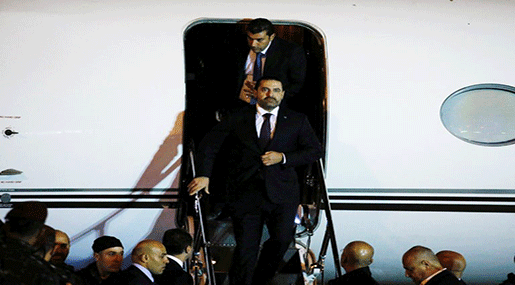
NYT: This Is How Saad Hariri Was Treated in Saudi Arabia

Local Editor
The New York Times daily revealed new details of Saudi Arabia's degrading treatment of Lebanese Prime Minister Saad Hariri, where the Lebanese leader was coerced into reading a prepared resignation speech under conditions similar to that of a captive.
In this context, the daily mentioned: "Hariri, long an ally of the Saudis, dressed that morning in jeans and a T-shirt, thinking he was going camping in the desert with the crown prince, Mohammed bin Salman."
It further highlighted: "But instead he was stripped of his cellphones, separated from all but one of his usual cluster of bodyguards, and shoved and insulted by Saudi security officers. Then came the ultimate indignity: He was handed a prewritten resignation speech and forced to read it on Saudi television."
"This, it seemed, was the real reason he had been beckoned to the Saudi capital, Riyadh, a day earlier: to resign under pressure and publicly blame Iran, as if he were an employee and not a sovereign leader. Before going on TV, he was not even allowed to go to the house he owns there; he had to ask guards to bring him a suit," the daily detailed.
The famous US daily went on to say: "As bizarre as the episode was, it was just one chapter in the story of Prince Mohammed, the ambitious young heir apparent determined to shake up the power structure not just of his own country but of the entire region. At home, he has jailed hundreds of fellow princes and businessmen in what he casts as an anticorruption drive. Abroad, he has waged war in Yemen and confronted Qatar."
"After delivering his speech, as his bewildered aides tried in vain to reach him from Beirut, Mr. Hariri did, indeed, eventually spend the evening in the desert with the crown prince, one senior Lebanese official said," it said, noting that "it was a surreal counterpoint to a series of events unfolding that day and into the night that set the entire Middle East on edge: a missile fired at Riyadh, the hundreds of Saudi princes and businessmen arrested, and Lebanon left stunned and confused."
"... when he landed in Riyadh, Saudi officials took Mr. Hariri to his house and told him to wait - not for the king, but for the prince. He waited, from 6 p.m. to 1 a.m. No one came. The next morning, he was summoned to meet the prince. There was no customary royal convoy, so Mr. Hariri took his own car. And instead of meeting the prince, officials said, he was manhandled by Saudi officials."
According to the New York Time, "Lebanese officials described the long hours between the arrival and the resignation as a "black box." They said they were reluctant to press Mr. Hariri for details. When asked, one of them said, Hariri just looked down at the table and said it was worse than they knew."
"Hariri, the officials said, was eventually placed with Saudi guards in a guesthouse on his own property, forbidden to see his wife and children. Within days, several Western ambassadors visited him there. They came away with conflicting impressions of how free he was. There were two Saudi guards in the room, officials said, and when the diplomats asked if the guards could leave, Mr. Hariri said no, they could stay."
"Lebanese officials," the report said, "began making the rounds to puzzled Western diplomats with an unusual message: We have reason to believe our prime minister has been detained."
"Now, Mr. Hariri remains in office with new popularity, and Hezbollah is stronger than before," the NYT said.
Source: NYT, Edited by website team
Comments



